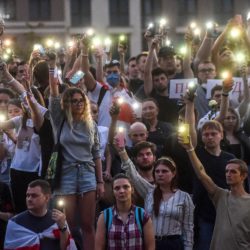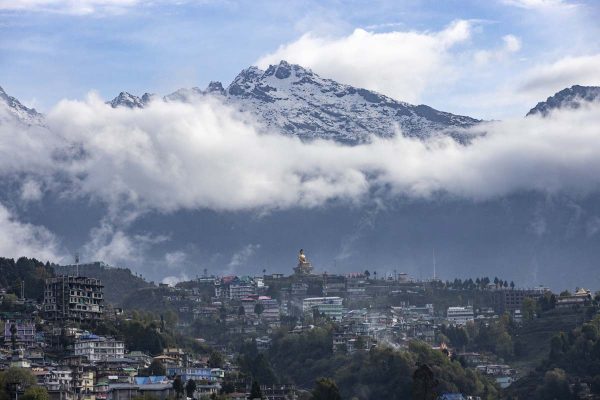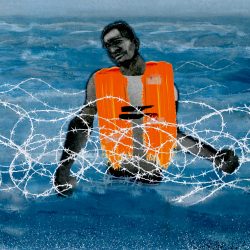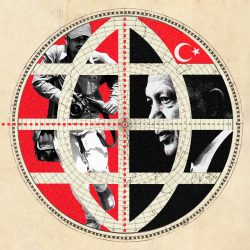
Nika Qutelia
Belarusian exiles are running out of hope
Sviatlana Tsikhanouskaya was worried about food trucks. At a festival for Belarusians in exile in Poland this summer, Belarus’ most important dissident had to answer for a lack of Belarusian catering.
“Why are there no Belarusian food trucks at this festival?” an attendee asked her, his voice tinged with frustration. Tsikhanouskaya had been thrust into a global spotlight after she ran for president in place of her husband — who was jailed by the Belarusian regime in May 2020. She paused before answering: It was possible to talk to the organizers.
Three years after a brutal crackdown on peaceful protests in Belarus sent a new round of exiles into neighboring countries with a wellspring of energy for changing the regime, the mood at the festival was subdued. Dissidents who not long ago were anticipating another revolution had reevaluated the situation: Nothing major could be done for now.
Hope for political change had run aground against the backdrop of the war in Ukraine and, not coincidentally, a worsening climate of repression inside Belarus. Russia’s grip on the government of “Europe’s last dictator,” Alexander Lukashenko, has only tightened, with Moscow using Belarus as a staging ground for its invasion of Ukraine in February 2022. Days before the festival in Poland, Wagner fighters had crossed into Belarus, invited by Lukashenko after their failed armed rebellion in Russia, a move that brought the Belarusian leader even closer to Russian President Vladimir Putin.
The Tutaka Festival was billed as the “festival of the awakened.” It had two aims: to celebrate Belarusian culture and to give Belarusian dissidents scattered across Eastern Europe an opportunity to meet up. Belarusian rock bands were the headline acts, but time was also given to panels on showing solidarity with the 1,513 political prisoners in Belarus and on renewing political activism. At the festival’s opening ceremony, an announcer observed that they were so close to the Belarusian border “that even the mosquitos were from home.”
Tsikhanouskaya had traveled to Poland from her base in Vilnius, the capital of neighboring Lithuania, to update exiles on her work. Since her forced departure from Belarus in August 2020, she has hosted informal Q&As on open video calls. Among the few hundred people who attended the festival on its opening day, around 50 huddled around to hear her speak. Following the first question, about the food trucks, another attendee asked if Tsikhanouskaya had visited art galleries on her diplomatic trips around the world. One person asked, as a joke, if she had a doppelganger, while someone else wondered if sanctions placed on Belarus should be eased in return for the release of political prisoners. There were no questions about when Tsikhanouskaya thought she might return home.
A 38-year-old festival goer who was attending with friends after two years of exile said he no longer felt optimistic at all. “I don’t see real power in them,” he told me, referring to the opposition movement as a whole. “They do a lot to support our paperwork, but I don’t see how they can change the situation in Belarus. The Belarusian regime has become too strong.”

When Lukashenko claimed victory in the August 2020 election, hundreds of thousands of people took to the streets in protest. Although it was not the first time that Belarusians had come out to protest election outcomes, 2020 was different. This time, many more citizens had mobilized. Factory workers went on strike, with some even heckling Lukashenko, calling for him to “go away.” The protests rippled out from Minsk, the capital, to smaller cities such as Gomel. Members of Lukashenko’s security forces left to join the protesters. Even after Tsikhanouskaya left the country, the protests continued without her. By the fall of 2020, it looked like Lukasheko’s time in office could be up. But it wasn’t to be. With the help of Russia, which promised military support, the old guard hung on.
It wasn’t long before the security services responded with excessive force. According to Human Rights Watch, almost 7,000 people were detained and held under inhumane conditions. At least two protestors were killed. Thousands fled the country fearing arrest or imprisonment. The repression of democratic voices in Belarus continued long after people were forced to leave the streets.
Lukashenko, who has been president since 1994, responded to the protests by further unraveling the country’s constitution and centralizing even more power around himself — in what political scientists call a personalized dictatorship. In a move to ensure no one ever challenged his power again, Lukashenko had Belarusians arrested for sharing pro-democracy Facebook posts or even wearing white and red, the colors of the flag that came to symbolize the 2020 protest movement. Sanctions from the EU and the U.S. did not deter the regime. Instead, it leaned more and more on Russia for economic support.
Dissidents and exiles looked on with mounting consternation as these events unfolded. Tsikhanouskaya initially encouraged people back home to publicly protest. But as the repressions grew, and as Russia invaded neighboring Ukraine, she began to tell them to wait for the right moment to trigger the next revolution. A few Belarusians ignored her calls and formed a group known as the “Rail Partisans” to disrupt Russian military supply lines in southern Belarus near the border with Ukraine. Members of the group were arrested and later sentenced to over 20 years in prison.
The heady days of 2020 began to fade, and exiled Belarusians questioned the optimism that had once sustained them. Tsikhanouskaya was increasingly viewed as more of a celebrity symbol rather than a viable presidential successor. Challengers to her status, such as the former Culture Minister Pavel Latushko, set up their own organizations. Other figures, such as Valery Tsepkalo, another 2020 presidential candidate who initially fled to Moscow, became outwardly hostile, accusing members of the exiled opposition of financial mismanagement. All of this signaled to dissidents that key players in the exiled opposition were focused on self-aggrandizement and petty politics rather than the democratic struggle.
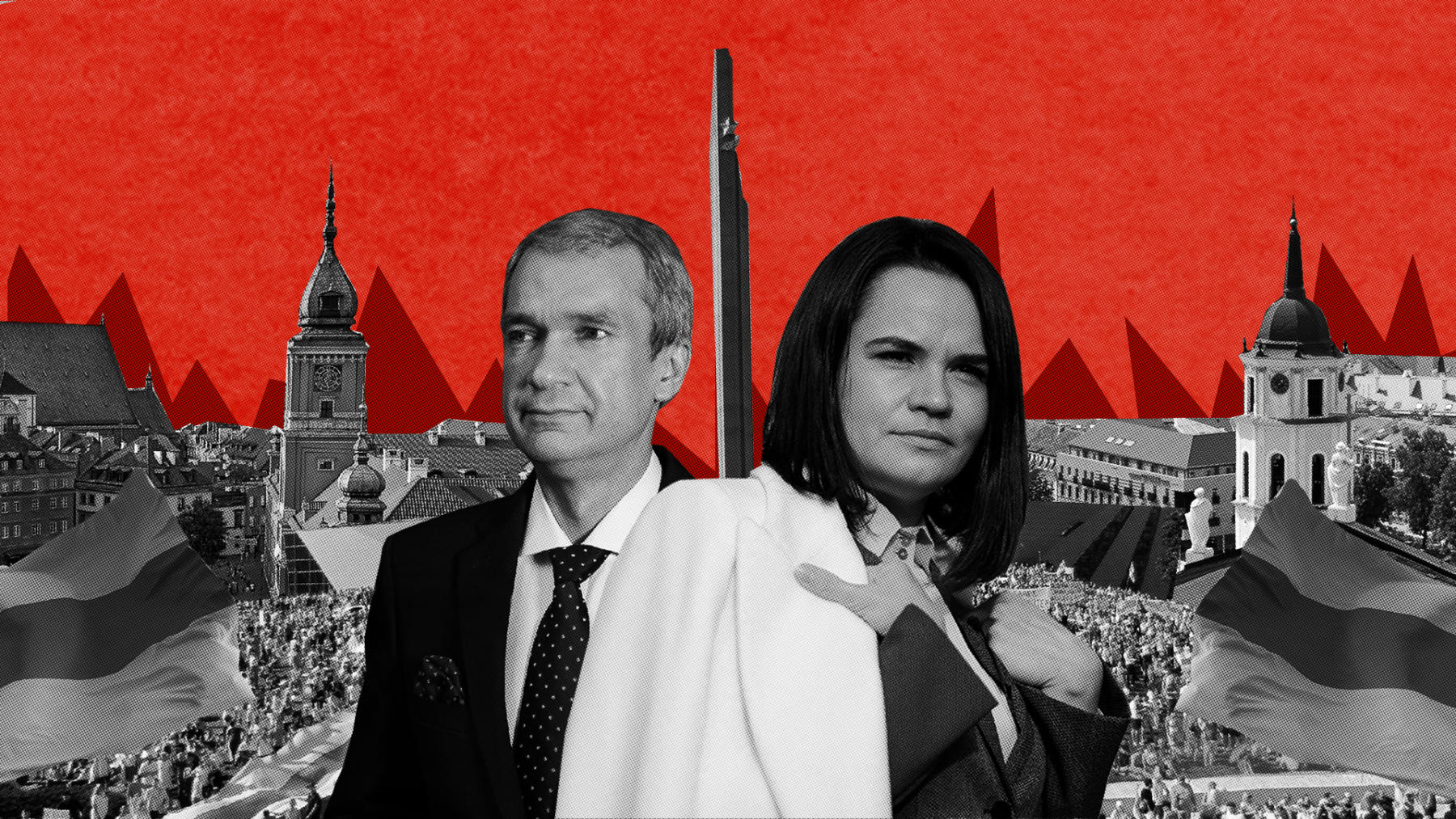
I learned about the Tutaka Festival from Anatoli, a 35-year-old dissident who fled Belarus two years ago after he was prosecuted on trumped-up charges for participating in the 2020 protests. (Anatoli asked that only his first name be used for the safety of family members who are still in Belarus.) He had grown up in the eastern Gomel region dreaming of a world beyond Belarus’ borders. His family’s resistance to Lukashenko in the mid 2000s had resulted in his expulsion from a local sports team and tarnished his future prospects. Having learned English, he managed to move to the U.S. as a student in 2009. He lived in Texas, Oklahoma, Georgia and California, working in IT and running profitable side hustles. But after a motorcycle accident, he returned home in 2017.
Anatoli felt he had come back to a country he could live in. Although Belarus still relied heavily on Russia for bilateral trade and loans to the tune of billions of dollars, Lukashenko had started to improve relations with the European Union. The Belarusian government didn’t pretend to share the EU’s democratic values, but it saw an opportunity to diversify trade away from Russia. In order to keep the door with the EU open, Lukashenko allowed some democracy-promoting organizations to set up shop.
There is an unwritten rule common to many authoritarian regimes: As long as you didn’t engage in serious opposition politics, the government largely left you alone. Anatoli continued to work in IT and began an import-export business. He built friendships and volunteered when the Covid-19 pandemic hit (while Lukashenko prescribed driving tractors and drinking vodka as a cure). But the 2020 election changed Anatoli’s tolerance quotient. “I had to get involved,” he told me when we met in Vilnius on a recent summer afternoon.
Shortly after taking to the streets in August 2020, he was arrested and thrown into Minsk’s notorious Okrestina jail for three days, where he was kept in a 215-square-foot cell with 80 other people. Upon his release, he went back onto the streets and attended protests most Sundays.
Anatoli was enamored by the unity shown by Belarusians. “I had faith when I went to the protests, I believed that something could change,” he told me. But he was targeted by security forces again and, in mid-2021, he left the country.
From the relative safety of Lithuania, Anatoli looked around at the world of the exiled opposition. What he saw were fractured and bickering groups, a situation he likened to Ivan Krylov’s fable “Swan, Pike and Crawfish,” a tale of three animals who failed to carry a loaded cart because they were each spinning “backwards,” “skywards” and “towards the sea.” Everyone wanted to do the right thing, but they were consumed by infighting and one-upmanship. It was frustrating, Anatoli said, to see the energy that swirled around Minsk in August 2020 being weakened in export.

Also in Lithuania, Tsikhanouskaya was setting up her office. From the outset, her young team sought diplomatic and financial support from the U.S. and the E.U. and took meetings with high-level politicians, such as the former chancellor of Germany, Angela Merkel. When Lukashenko ordered the grounding of a Ryanair flight traveling through Belarusian airspace that was carrying Roman Protasevich, a dissident who helped to steer the 2020 protests, Tsikhanouskaya’s office kept up the pressure for Western sanctions. Protasevich later became a Lukashenko spokesperson, after trading his freedom for a change in his public position on the regime. But there were also rumblings from exiles, like Anatoli, suspicious that members of Tsikhanouskaya’s team were ultimately concerned with future-proofing their own careers.
A conversation with exiles about Tsikhanouskaya will almost always turn to Franak Viacorka, the 35-year-old spearheading her team’s agenda. Known for his intellect and for being a demanding boss, Viacorka has been referred to as the democratic movement’s gray cardinal, the shadow power in the office. It’s a characterization he rejects. He sees himself instead as the “toxic handler,” a term he came across when reading up on business management: a person who deals with toxicity, frustration and apathy. Viacorka is a smooth communicator — having frequently engaged with the international press over the past three years and worked as a journalist himself — and he speaks in neat, quotable sentences.
Viacorka told me there was more support for Tsikhanouskaya than two years ago but recognized that there was also frustration. “What people don’t understand is that Sviatlana and the office is only as strong as the people around her, as strong as the movement,” he said. He also told me that Tsikhanouskaya fights sexist headwinds, the idea “that a woman cannot be successful on her own accord.”
We first met at the Tutaka Festival where he had camped with a group of friends and colleagues. In Vilnius, where we sat down to talk, Viacorka was in full work mode, getting ready for an event to commemorate the anniversary of the 2020 protests. He had been with Tsikhanouskaya’s office almost from the beginning, when he fled Minsk for Kyiv and then turned his attention to Vilnius to help Tsikhanouskaya establish herself in exile. Since then, Viacorka has “connected the dots,” helping his boss understand the history of Belarus’ opposition and chart the path forward. But to many on the outside, he seems opportunistic. In Anatoli’s eyes, “he’s been raised as a politician” and should be treated with caution. Viacorka told me he harbors no political ambitions.

There is a dizzying array of organizations vying for attention in administering the Belarusian opposition in exile. They include Tsikhanouskaya’s office, the Coordination Council, the United Transitional Cabinet and the National Anti-Crisis Management organization. To Anatoli, it seemed all these groups were too busy vying for power among themselves rather than bringing about genuine change to their country.
So, instead of becoming involved with any of them, he began to help out with grassroot organizations that centered around sport. He was convinced that a revolution in Belarus was not possible while the country was still traumatized by the events of 2020. With emboldened security services, he told me, people wouldn’t risk taking to the streets unless a monumental event took place. “The person who will actually change things will be an outsider,” he said. “Look at Zelenskyy, he worked under the radar for years.”
Since early 2022, Anatoli and his friends have turned their attention to helping Ukraine in whatever way they can. They organized aid and medical supplies for both the Belarusians and Ukrainians who were fighting on the frontline and for refugees. When the invasion began, hundreds of Belarusians rushed to help Ukraine defend itself against the Russian army. Their hope was that a Ukrainian victory would also herald the end of Lukashenko’s rule, but as the war dragged on, the number of Belarusian volunteers is reported to have declined.
In fact, the exiled opposition’s relationship with the Ukrainian government has been strained since the early days of the war. The Ukrainian government has been slow to oppose Lukashenko, who has not formally joined the war. Lithuania’s former foreign minister, Linas Linkevicius, told me that Tsikhanouskaya’s early position on Russia had cast doubt in the mind of Ukraine’s leaders. “Tsikhanouskaya still had the hope of talking to Moscow during the 2020 protests and that is something that hasn’t played well with Kyiv,” he told me.
In February, Zelenskyy’s advisor Mikhail Podolyak gave a damning critique of the Belarusian opposition, telling Lithuanian media that Ukraine does “not see any reason to develop these relations, because we do not see a clear anti-war activity on the part of the opposition.” When asked about a formal meeting between Zelenskyy and Tsikhanouskaya, Podolyak said that the Ukrainian president did not see value in it.
But since the invasion, Tsikhanouskaya has been fervently anti-Russia, arguing that only a victorious Ukraine can bring a new dawn to Belarus. When I met Tsikhanouskaya briefly on the sidelines of the Tutaka Festival, I asked her about her relationship with Zelenskyy. Before answering, she took a long pause, her deep brown eyes scanning for the right words. The relationship was changing, she said: “At the beginning, they didn’t even want to communicate with us because they didn’t want to irritate Lukashenko. But now, it’s evident that Lukashenko is on the side of the Kremlin.”
I asked her about the exiles and dissidents and their allegations of ineffectiveness leveled against her team. Tsikhanouskaya said that although momentum has waxed and waned over the course of the last three years, her team was working toward that moment when the Belarusian system is suddenly disrupted and an opportunity for real change emerges. Others in exile must stay the course and not wait for everybody else to do the work, she said.
Anatoli gave me his response when I told him what Tsikhanouskaya had said. “The longer you’re in exile, the more you need to start thinking about where else you can build your life,” he said.
The story you just read is a small piece of a complex and an ever-changing storyline that Coda covers relentlessly and with singular focus. But we can’t do it without your help. Show your support for journalism that stays on the story by becoming a member today. Coda Story is a 501(c)3 U.S. non-profit. Your contribution to Coda Story is tax deductible.





